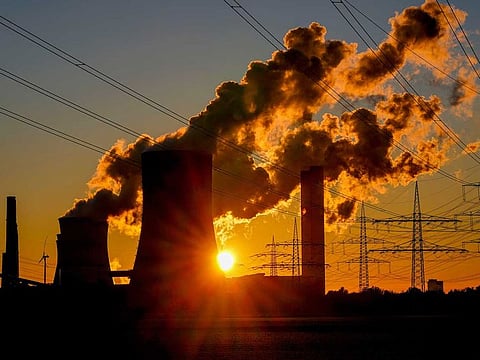Britain tells climate summit coal era to end as carbon emissions surge
COP26 coal reduction initiative signs up 77 countries

Glasgow: UN conference host Britain said 77 countries had pledged to phase out coal, dirtiest of the fossil fuels that drive global warming, as a study showed the carbon dioxide they release into the atmosphere had already rebounded to near pre-pandemic levels.
“We were expecting to see some rebound,” said the study’s lead author Pierre Friedlingstein, a climate modelling researcher at the University of Exeter. “What surprised us was the intensity and rapidity of the rebound.” Alok Sharma, British president of the two-week COP26 conference in Glasgow, said it was on its way to gradually ending use of the world’s most widely used fuel - coal.
He said on Thursday 77 countries had signed a pledge to phase out coal-fuelled power generation - which accounts for more than 35% of world’s power - and stop building new plants.
“Today I think we can say that the end of coal is in sight,” Sharma told the conference.
He said there had been rapid progress since 2019: “Who’d have thought, back then, that today we are able to say that we are choking off international coal financing or that we would see a shift away from domestic coal power?” It remained to be seen whether the pledges would highlight divisions between wealthy nations, pushing for a swift end to the dirty fuels of the industrial revolution, and poorer developing countries that, despite all their disadvantages, rely on cheap, accessible coal and other fossil fuels to grow.
More than 90% of the 195 coal plants being built around the world are in Asia, and this year, coal demand is set for a new record.
‘A big step forward’
In 2020, carbon dioxide emissions fell by a record 1.9 billion tonnes - a 5.4% drop - as countries locked down and economies ground to a halt because of the coronavirus pandemic.
The new report, produced by the Global Carbon Project, forecasts emissions will rise by 4.9% this year.
Nevertheless, the International Energy Agency said that, if the emissions-cutting pledges made so far were all fulfilled, the rise in the global temperature could be limited to 1.8 degrees Celsius since pre-industrial times.
This would be a significant step towards the 1.5C the United Nations says is needed to halt potentially irreversible climate effects that would dwarf the intensifying storms, heatwaves, droughts and floods that the world is already experiencing.
“New @IEA analysis shows that fully achieving all net zero pledges to date & the Global Methane Pledge by those who signed it would limit global warming to 1.8C,” IEA chief Fatih Birol tweeted. “A big step forward, but much more needed!” The IEA, the world’s top energy watchdog, this year said that to achieve the U.N. goal of ‘net zero’ emissions by 2050, no new fossil fuel projects should be approved after 2021 - a goal the pledge hailed by Sharma is certain to miss.
The British government said on Wednesday it expected 190 nations and organisations to sign up to the non-binding pledge, in which richer countries would phase out coal-fuelled power generation in the 2030s in richer countries, and poorer countries in the 2040s.
It was not immediately clear if the deal would include countries such as China, India, Indonesia and Turkey, which have numerous new coal power developments planned.
In September, China said it would stop funding overseas coal plants, although the pledge did not cover domestic projects.
China has almost half of the more than 2,600 coal plants operating or under construction in the world.
Fossil finance
At least 20 countries plan to commit at the summit on Thursday to stop public financing for fossil fuel projects abroad by the end of next year, according to two people familiar with the talks.
Banks and other financial institutions including the ADB, Citi and HSBC are also expected to step up by announcing financial mechanisms to help countries quit coal.
More countries also may join the Beyond Oil and Gas Alliance, led by Denmark and Costa Rica. That effort commits members to phasing out fossil fuel production within their own borders, but it will not formally be launched until next week.
On Tuesday, countries including Britain and the United States announced an $8.5 billion partnership to help South Africa phase out coal faster.
There was a sharp reverse, however, for one of the most eye-catching announcements of the conference so far - a pledge by more than 100 leaders to halt and reverse deforestation and land degradation by the end of the decade.
Indonesia, home to huge tropical rainforests, said Monday’s agreement was at odds with its own development plans.
In 2019 alone, an area of Indonesian forest and other land half the size of Belgium was burned for palm oil plantations.
“Forcing Indonesia to zero deforestation in 2030 is clearly inappropriate and unfair,” Environment Minister Siti Nurbaya Bakar, who attended the summit, said in a tweet.
Sign up for the Daily Briefing
Get the latest news and updates straight to your inbox






